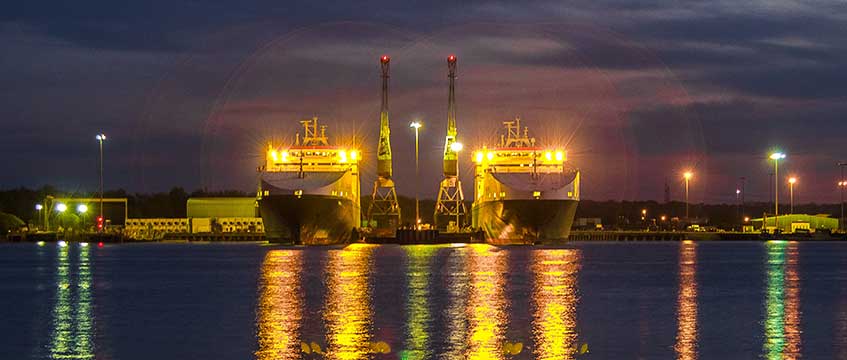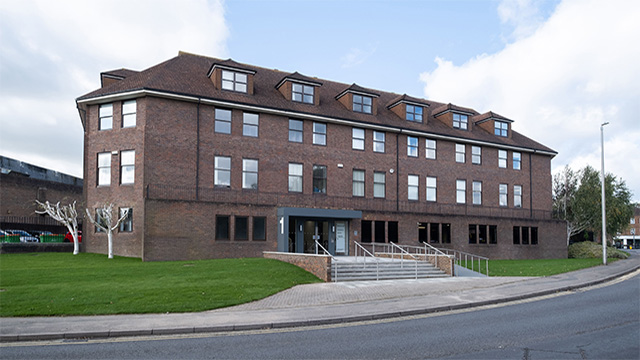How the Solent Freeport is reinforcing the area as a hub for global trade
COMMENT T h e Solent Freeport is one of eight freeports announced by the government at the March 2021 budget and includes the ports of Southampton and Portsmouth and sites along the western side of Southampton Water, north-east of the airport and at Dunsbury Park, Havant.
The Solent Freeport will become an area where special conditions and exemptions are applied, which creates additional economic activity. These include stamp duty land tax relief, enhanced structures and building allowance, enhanced capital allowances, employer national insurance contributions rate relief, business rates relief and simplified and faster planning. There is also the potential to benefit from infrastructure funding to open up sites. Since the announcement, the region has already seen additional investment and activity, which is expected to drive further growth and confirm the Solent as a leading global port.
Prime objective The objectives of the Solent Freeport include establishing the area as a hub for global trade and investment, to promote productivity and regeneration, and to create jobs. It also aims to create centres of innovation and skills, accelerate the transition to a net zero economy and approach to climate change adaption and decarbonisation.
COMMENT The Solent Freeport is one of eight freeports announced by the government at the March 2021 budget and includes the ports of Southampton and Portsmouth and sites along the western side of Southampton Water, north-east of the airport and at Dunsbury Park, Havant.
The Solent Freeport will become an area where special conditions and exemptions are applied, which creates additional economic activity. These include stamp duty land tax relief, enhanced structures and building allowance, enhanced capital allowances, employer national insurance contributions rate relief, business rates relief and simplified and faster planning. There is also the potential to benefit from infrastructure funding to open up sites. Since the announcement, the region has already seen additional investment and activity, which is expected to drive further growth and confirm the Solent as a leading global port.
Prime objective
The objectives of the Solent Freeport include establishing the area as a hub for global trade and investment, to promote productivity and regeneration, and to create jobs. It also aims to create centres of innovation and skills, accelerate the transition to a net zero economy and approach to climate change adaption and decarbonisation.
Within the freeport area there are two sites – custom sites and tax sites. Custom sites are port related, where you will find bonded warehouses – a secure space in which goods liable to import duty and VAT are stored. Tax sites do not have to be port related and have been developed to attract innovation and tech occupiers that wouldn’t ordinarily be located in the area unless an incentive was offered.
The Solent Freeport is anticipated to create tens of thousands of new jobs, drive the levelling-up agenda in the region and provide a centre of excellence in green skills and jobs to ensure local communities, in particular young people, can benefit. This would also benefit the wider UK, as the Port of Southampton supports 12,000 jobs in the West Midlands – a quarter of its total jobs support figure nationally.
Within the port, the owner, ABP, has recently started marketing a 22-acre site as a tax site for new development, aimed at port-related occupiers in a combination of units or a single unit up to 600,000 sq ft.
At Fawley Waterside, tax site status is supporting the redevelopment of the former Fawley Power Station to provide a mixed-use scheme, including up to 1.5m sq ft of employment space targeting advanced manufacturing and marine and tech industries. Improvements to infrastructure are already proceeding, including road access and power upgrades.
At Navigator Quarter, north-east of Southampton Airport, tax site status is key to providing infrastructure works that will open up previously undeveloped land.
Dunsbury Park, Havant, an existing warehouse/distribution park has also been designated as a tax site. This will enable the business park to widen its appeal to new occupiers, in a range of units from 20,000 to 200,000 sq ft.
More broadly, the freeport location makes it an important gateway to European and global markets. Southampton Port is a major exporter and redistributes goods from places such as South East Asia into mainland Europe. Therefore, port facilities and storage must be able to compete with other European ports such as Rotterdam.
This means the freeport status is incredibly important for Southampton and Portsmouth to remain competitive with European ports and accelerate investment in improving and modernising facilities.
A number of investment programmes are already under way. Portsmouth International Port secured more than £11m from the Levelling Up Fund to transform its terminal, providing employment opportunities and complementing the offer as the UK’s leading marine and maritime region.
The importance of investment
Additionally, DP World announced a £40m investment programme to ensure DP World Southampton can accommodate the surge of interest from companies looking to take advantage of the customs zone and tax benefits. The infrastructure investment would ensure it would be able to accommodate the world’s biggest ships. It would also enable the redevelopment of the yard for storage and delivery of containers, a new border control post and port health inspection facilities, plus the extension of the quay crane rail to ensure the cranes can service all berths at the terminal.
These are just a few examples that will help maintain and develop the Solent into a more efficient and modern distribution hub. This has become even more vital following our exit from the EU.
We are already seeing strong interest from the marine and aerospace sectors, AI and alternative fuel technologies. The need for continued investment into adequate infrastructure to support these businesses cannot come fast enough. Issues such as power for high-end manufacturing need to be addressed to compete and remain competitive internationally and the freeport status is an important tool in achieving this.
Martin Hastelow is director and head of commercial agency at Savills Southampton
Image © Roman Grac/Pixabay











